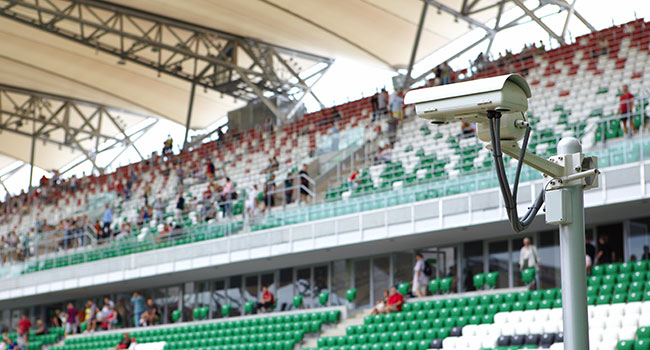
Stadium Security Goes High-tech With Elevated Standards, New Innovations
- By Peter Evans
- Feb 08, 2022
When it comes to physical security, the world around us has changed. First, society has changed, with more social unrest and violence occurring in the COVID-19 era, including a rise in fan misbehavior at sporting events. Second, stadiums have changed, with more high-tech amenities, luxuries and conveniences.
Giant LED video screens, specialized apps for food and parking – even spa cabanas and a dog park are available at some of today’s modern venues. These are no longer “parks” or “stadiums,” they are “entertainment experiences.” Finally, security threats have changed, with a wider range of weapons that are more sophisticated and easier to hide.
One thing that has not changed over time are the standard metal detectors that most of us have walked through at some point. Metal detectors are still based upon 40-year-old, outdated technology that was built for a different purpose and environment. The good news is the digitization that has radically transformed multiple industries is now taking place in the physical security sector. While a new wave of technological advancements can provide many opportunities to improve stadium security, the key is to do so in a standardized manner that can scale up league-wide and provide a safe and convenient fan experience.
Keeping Fans Safe, Improving the Fan Experience
Over the past year, I’ve met with security executives at multiple professional sports leagues, who explained their goals and challenges for keeping fans, staff and athletes safe at their stadiums and arenas across the United States and Canada. The key challenge is improving fan safety, while also delivering an optimal fan experience.
Fans don’t want to wait in long, slow security lines (or any lines) when attending a game. This holds true for any new technology – it needs to make life easier for fans, not worse. Otherwise, things can get ugly, and quickly. For example, at a September 2021 Pittsburgh Steelers game, lines backed up and fans became angry over issues with paperless ticketing.
From a security standpoint, stadiums can be an attractive target due to their size. The number of people who attend a professional football game on a typical Sunday is often three times larger than the population of most mid-sized U.S. cities. How can major sports leagues, and their teams, keep thousands of fans safe from venue to venue, in a consistent manner? There are industry standards that the leagues are currently evaluating that can help to elevate security efforts league-wide and nationwide. With the Super Bowl coming soon, we’ve seen full stadiums throughout the NFL playoffs, which puts stadium security top-of-mind.
Emerging Standards for Physical Security
While some of the security standards under consideration were originally created before the rise of the Internet, various leagues are working with organizations to innovate and elevate the requirements to meet today’s emerging threats and embrace new advanced technologies.
For example, the National Center for Spectator Sports Safety and Security (NCS⁴) is working with vendors and venues to better understand how technologies are addressing capability gaps. Through their Operational Exercise program, the NCS⁴ creates use cases and educates the industry on existing and emerging technologies.
Working together, leagues, solution providers and organizations like the NCS4 can collaborate to vet and identify solutions that meet the needs of an evolving threat landscape and operational environment.
New Technologies Rise to the Standards
What will team executives and arena operators need to do to meet the standards? Emerging vendors are utilizing the latest advancements in artificial intelligence, computer vision and other innovative technologies to make stadiums and arenas safer, while making the screening process faster, less intrusive and more convenient.
In 2022 and beyond, these new artificial intelligence (AI)-based systems will replace the traditional walk-through metal detector and provide a more proactive, advanced warning system – with better intelligence – to make stadium security staff more proactive and effective at each venue. These new systems will not only allow stadiums to meet stringent league requirements, but will also help make security staff, guest experience, marketing and overall operations more efficient during games.
Efficiency is important, because in the age of “the great resignation,” security teams are often short-staffed, so this new technology can also help stadium security directors to deploy their existing human resources as efficiently as possible. The new technology frees up time for staff to focus on interacting directly with offending fans as issues occur, rather than looking at dozens of security screens for hours.
The New Era = Safety and Convenience, Driven by Technology
More new-age, multi-billion-dollar “Experience” venues are being built right now, and fans are eager to get back to the energy and “buzz” that one can only experience at an in-person game. Along with this, we’ll see the term “fan experience” become increasingly important to teams and venues, and as ticket prices increase, fans will demand more from game day.
In recognition of this trend, professional teams have hired Chief Experience Officers to join their executive ranks, tasked with improving all aspects of the fan experience. Security is a key part of this equation, and a priority for professional sports leagues. New technology and industry standards can lead the way to better security and a better fan experience. This is a winning combination that can make game day the best it can be – for everyone.